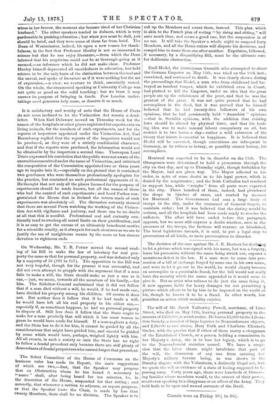It is satisfactory and worthy of note that the House
of Peers do not seem inclined to let the Vivisection Act remain a dead- letter. When Earl Delawarr moved on Thursday week for the names of the hospitals or other places registered for experiments on living animals, for the numbers of such experiments, and for the reports of inspectors appointed under the Vivisection Act, Earl Beauchamp replied that the reports of the inspectors would not be produced, as they were of a strictly confidential character, and that if the reports were produced, the information would not be obtainable by the inspectors a second time. Thereupon Lord Truro expressed his conviction that the public were not aware of the enormities committed under the name of Vivisection, and criticised the composition of the Commission appointed two or three years -ago to inquire into it,—especially on the ground that it contained two gentlemen who were themselves professionally apologists for the practice, but contained no such professional opponents of it. He thought that not only all the places licensed for the purpose of experiments should be made known, but all the names of those who had the control of such experiments ; and Lord Forbes con- gratulated the House that in Ireland the return made of such experiments was absolutely nil. The discussion certainly showed that there are several Peers watching the working of the Vivisec- tion Act with vigilance and jealousy, and there can be no doubt at all that this is needful. Professional zeal and curiosity con- tinually tend to overleap all moral limits on their gratification, and it is as easy to get the excuse of an ultimately beneficent motive for a scientific cruelty, as it always is for such creatures as we are to justify the use of unrighteous means by the more or less sincere devotion to righteous ends.


































 Previous page
Previous page